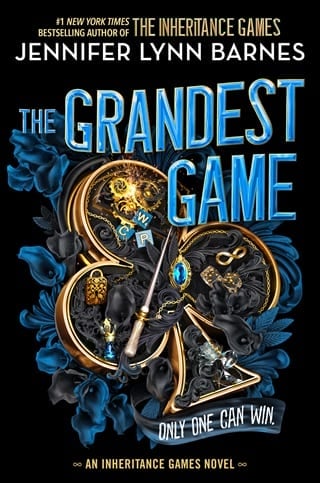CHAPTER 66 LYRA
Chapter 66
LYRA
T he sudden absence of light hit Lyra almost as hard as the words that refused to stop looping in her mind on gut-rending repeat. Last year, when I told you to stop calling—I didn't mean it.
Of course he'd meant it. He was Grayson Hawthorne, and she was nobody. What did her tragedy matter to him? What did she matter?
And yet.
And yet.
And yet.
"Lyra." Grayson's voice was close in the darkness. "You're okay?" He made that question sound more like a command: She would be okay, because he wouldn't allow her to be anything else.
"I'm not scared of the dark," Lyra told him. "I'm…" She almost said fine , but that word felt loaded now. "I'm just dandy."
"I'm not," Odette said, strain audible in her voice. "Just dandy."
Lyra remembered the old woman's earlier pain, remembered that she was dying.
"What's going on? Tell us your symptoms," Grayson ordered.
"My symptoms include a tightness in my jaw, increased heart rate, and a desire to use foul language in particularly creative combinations."
"You're angry," Lyra realized. Not in pain—or at least, not any more pain than you're used to.
"We were given a certain allotment of time to complete this challenge," Odette replied, "and now, it is suddenly clear that the time we thought we had left before dawn was an illusion—a twist befitting of a Hawthorne game, is it not? Misdirection and illusions in place of truth."
Lyra thought suddenly about Odette saying that Tobias Hawthorne was the best and worst man she'd ever known.
"Had this outage been planned," Grayson said slowly, "we would have been given a hint foreshadowing its occurrence—in the metal room, perhaps, or straight from the beginning. We would have puzzled over some cryptic line or clue, and the moment the lights went out, everything would have made sudden, crystalline sense. But this? It's senseless, and I assure both of you, that is one thing that Hawthorne games are not."
Listening to Grayson, it was impossible for Lyra not to believe him—about the game and about everything else. Last year, when I told you to stop calling—I didn't mean it.
"The emergency and hint buttons," Lyra said, the words coming out thicker than she meant for them to. "Do they still work?"
"I'll try them," Grayson said—but Lyra beat him to it, moving through the dark like it was nothing, finding the buttons, pressing them.
There was no response.
"The radio's out," Grayson concluded. "I told you—this wasn't planned."
"Perhaps not by your brothers or Ms. Grambs," Odette said. There was something understated in her tone, something soft and deeply concerning.
"Speak plainly, Ms. Morales." Grayson ordered through the darkness.
"Layers upon layers." Odette's voice never changed—not in volume, not in pitch, not in emphasis or pacing. "In the grandest of games, there are no coincidences."
She hadn't said the Grandest Game . She'd said the grandest of games —like they were two different things.
"The house." Odette clipped the words. "This room. The locking mechanisms, the elaborate chain reactions—they aren't entirely manual, are they? They require power."
"Yes," Grayson said, and Lyra translated that Grayson Hawthorne yes .
This time, they really were locked in—and it wasn't a part of the master plan.
 Fullepub
Fullepub 



